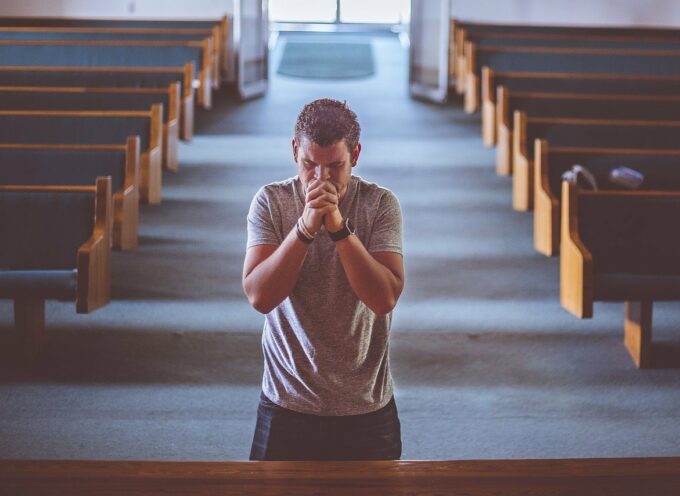Each year, any number of Christian writers and preachers extol the virtues of the Thanksgiving holiday, while lamenting the vices of its Black Friday successor. They equate Thanksgiving with gratitude and Black Friday with greed. They encourage Americans to participate in Thanksgiving and boycott Black Friday.
But that is not quite right. Christian should freely participate in both Thanksgiving and Black Friday.
Allow me to explain. In Romans 1, the apostle Paul writes that God directs his wrath toward humanity because we refuse to glorify him or be thankful for him as God (1:21). He goes on to explain our ingratitude in terms of our tendency to worship the things God created rather than worshiping God himself (1:25). We sin when we love creation more than the Creator, when we love God’s gifts more than we love the Giver.
In other words we should not take God’s good gifts and turn them into counterfeit gods and false saviors. A counterfeit god is anything in this world that we elevate to the position of ultimacy reserved for God alone. A false savior is anything in this world that we depend upon to redeem our broken lives. These counterfeit gods and false saviors cannot be trusted because they are not gods and they cannot save.
What does this have to do with Thanksgiving and Black Friday? As I see it, Christians should view Thanksgiving and Black Friday as different sides of the same coin. Both holidays provide a unique opportunity to be thankful for God and his gifts while at the same time refusing to be more thankful for his gifts than we are for God himself.
Thanksgiving should remind us that everything we have comes from the hand of God.
As we reflect upon the value of Thanksgiving Day, pause for a moment in order to make a list of some of the people, circumstances, and things God has given you for which you are grateful. My list would include people such as my wife and children, siblings, parents, in-laws, and many colleagues and friends. It would include circumstances such as a good job and a faithful church. And it would include things such as a house that is warm during cold months, an office wall full of hardback theology texts, and a kitchen equipped with a Bialetti Moka express.
Now consider the dignity and humility of those things for which we are grateful. Those people and things possess a great dignity because they are gifts from God. But they also possess a great humility because they are not God. When we don’t pause regularly to thank God for the good things in our lives, we are failing to grasp their dignity. When we obsess about the good things in our lives—making them overly important to our happiness—we are failing to grasp their humility.
An Inventory of Gifts We Overlook
On the one hand, Thanksgiving provides the perfect opportunity to take inventory of the many good gifts God has given us which we tend to overlook. Our inventory might include questions such as:
- Are there people in my life I tend to overlook? Whom should I recognize as a distinct blessing from God?
- What circumstances in my life could easily be different or worse, except for the loving hand of God?
- Which of my possessions do I enjoy with a sense of entitlement instead of recognizing them as God’s good gifts?
An Inventory of Gifts We Overvalue
On the other hand, Thanksgiving also provides an opportunity to take inventory of those gifts upon which we place too much value. Our inventory might employ questions such as:
- Which of God’s gifts do I tend to love more than God himself? Which of those gifts cause me more delight than God or create in me a more heightened sense of expectation than God?
- Which of God’s gifts do I tend to trust more than God himself? In other words, what are the persons, things, or circumstances that function as my security in a way that God alone should function?
- Which of God’s gifts do I tend to obey in a way that God alone should be obeyed? Which persons, things, or circumstances command my allegiance and shape my life to a greater extent than God?
- Which of God’s gifts, if taken away, would cause me the most anger, despair, or depression?
Black Friday should remind us not to look to God’s gifts for salvation.
As we reflect upon Black Friday, pause for a moment to think about some of the blessings of living in the United States of America. My list would include gratitude for the freedom to assemble on Sunday mornings to worship with my church and the freedom to live out my faith in public without fear of reprisal. It would also include thankfulness for a military who protects us, an economy that is relatively stable, the many citizens who make our nation a good place to live, and the abundance of goods and services available.
Now, on the flipside, take a moment to reflect on the temptations caused by living in a nation characterized by the abundance of goods and services, the ability to “get ahead” through hard work and ingenuity. At the top of my list is the fact that our consumer economy can lure us into thinking that material goods will redeem our brokenness.
Going to the Mall without Treating it as the Church
As Jamie Smith notes, the mall is a crystallization of that temptation. Consider three ways a visit to the mall or a car dealership on Black Friday can quickly lure us into false worship:
- First, it creates in us a desire for things we do not need. We see the happy, successful people in the advertisements and we want what they have. We see a disconnect between their lives and ours and think we’d be happier if we just had the Louis Vuitton purse or that Ford F-150.
- Second, it promises that if we acquire these things, our broken lives will be redeemed, our sadness turned into happiness, and our emptiness filled with meaning. In other words, it lures us into thinking that shopping is therapeutic and redemptive. But the promise is false; not only can these goods and services not save us, but they change every year! What is “in” (redemptive) one year is “out” (not redemptive) the next.
- Third, if we begin to doubt the promise of redemption-via-shopping, the salespeople and marketers can function as pastor-evangelists who help us believe once again. They offer advertisements and sales pitches that appeal to our desire for happiness, independence, sexuality, power, and perfection.
There is nothing at all wrong with shopping on Black Friday or any other day. In fact, Black Friday offers an opportunity to buy gifts for family and friends or to obtain goods and services for ourselves. But in our shopping, we should be careful that we are not being drawn into false worship, convinced to buy things because unconsciously we think these things will provide the redemption that Christ alone can provide.
Subscribe
Never miss a post! Have all new posts delivered straight to your inbox.







